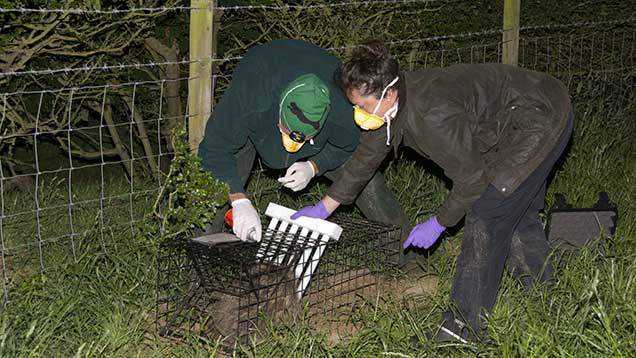NFU challenges wildlife groups to help tackle bovine TB
 © Rex
© Rex Wildlife groups should stop using old science to back arguments for a badger cull and play a bigger role in vaccination programmes, according to NFU president Meurig Raymond.
Mr Raymond also issued a challenge to wildlife trusts to use their funding and their physical resources to help boost badger vaccination programmes in TB “edge” areas adjacent to disease hotspots.
Speaking at a Devon county NFU meeting on 28 November, Mr Raymond said: “This is what you’ve been calling for and now it’s time to put your money on the table and get out there to carry out the vaccination in the clean areas, to put up the barriers to prevent the spread of this disease.
“Farmers have been working hard on the ground and now you need to step up, too.”
On the pressure groups’ scientific justification for ending badger cull trials, he said: “You need to look at the current science – what is actually happening on the ground.
“By culling infected wildlife, Australia and New Zealand have slashed TB rates by far more than the supposed 16% decline predicted by the Krebs trial in the 1990s.”
He added: “In the Somerset cull areas there are herds going clear of TB after being under restriction for many years – that is proof that it is working. And there are 10 times more ground-nesting birds in the Gloucestershire area since the cull started.”
Defra secretary Liz Truss also spoke at the meeting and was quizzed on whether the badger trials would go ahead next year.
Ms Truss insisted the government remained fully committed to eradicating TB but stopped short of pledging to roll out the badger cull across Britain.
“We are constantly reviewing the best way of carrying out the cull, and we need to keep honing the strategy to make sure it works,” she said. “We are awaiting the chief veterinary officer’s assessment of this year’s culls, and are absolutely committed to seeing this through.”
Labour would end the culls if it won the general election next year, warned Ms Truss. “That is the wrong approach. International evidence shows that (culling in areas where disease is rife) is the only way to tackle the disease. We need to continue with the programme and take consistent action over a number of years – you can’t expect immediate results.”
